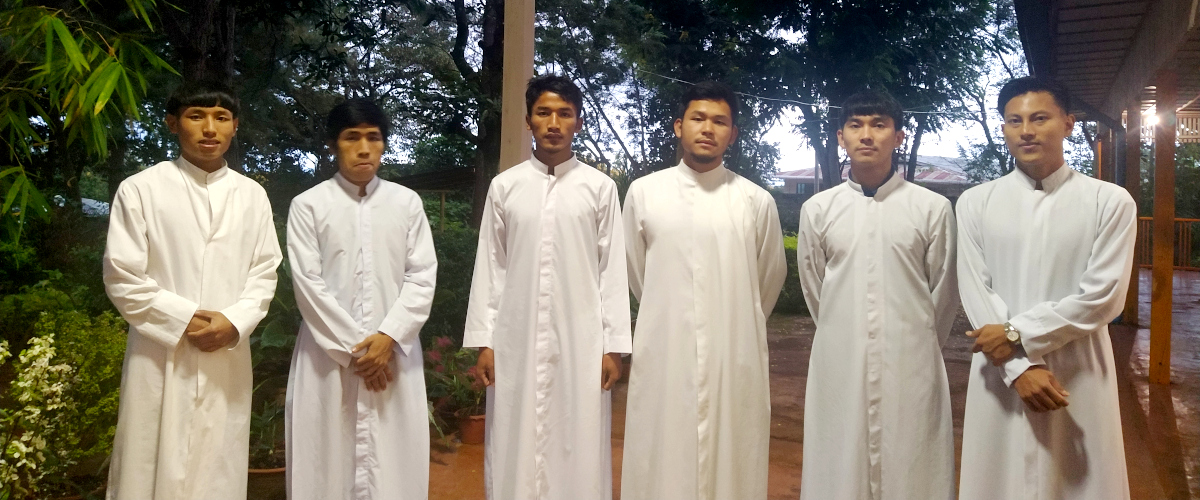
The second year novices from the Santa Maria della Strada Novitiate in Myanmar undertook a month-long hospital experiment. One group went to a leprosy shelter in Hokhai village and another served in a house for people with disabilities. These “experiments” or tests as established by St Ignatius himself are a key stage in the novices’ formation towards their First Vows. They are a means to examine, clarify, and confirm freely their vocation in the Society. In this article, we get a glimpse of their experience while undertaking the hospital experiment.
—
From the Jesuit novitiate in Taunggyi, Gregory, Laurence, and Henry (2nd, 3rd and 5th in the photo) travelled to the leper colony in Hokhai, where they were accompanied by the sisters serving in the facility. There was no checkpoint on the way but on their return trip they were asked a few questions at one of the checkpoints.
The shelter in Hokhai has around 110 patients who came from different villages to live under the care of the priest and sisters serving in the colony. The novices, guided by Fr Kyaw Aye and Sr Armi, were assigned to help Br Kyaw Moe, a volunteer in the clinic, in providing medicines and cleaning the wounds of the patients, some of whom need assistance in taking their medicine twice a day. The Jesuits also helped clean the patients’ houses and held classes for refugee children from Phekhon and those in the pre-school.
“Our daily schedule was quite packed and tiring and yet filled with joy,” the novices wrote in their reflection. Besides serving in the hospital throughout the day, they also helped the local students who attend night school, and on the weekends, they taught catechism to the children. They also had to do the shopping and cooking for themselves.
After 32 days, the novices returned to the novitiate grateful for their experience in Hokhai. “There were many challenges in our work, especially in communicating with the patients since we did not speak the same language, in helping them take their medicine, and the odour from the infection, but those were opportunities where we came to know ourselves better as well as where we learnt to grow.”
Meanwhile back in Taunggyi, Julian, Si Thu Aung, and Mark (4th, 1st and last in the photo) did not have to travel far for their experiment. They were sent to the Infant Jesus Community just a few steps from the novitiate. The community houses people of various ethnicities who are either orphans, mentally or physically challenged, or have been displaced from Kayah state. The novices were each assigned a person with disability to care for 24/7. They washed their clothes and linens daily, helped them get out of bed in the morning and go to bed at night, as well as in moving around the community. They also helped in feeding, washing, bathing, and dressing them, as well as in visits to the toilet.
“Serving our brothers and sisters in the Infant Jesus community was a good opportunity and a joyful experience to build in each of us a stronger apostolic zeal,” the novices said. “In the Gospel, we know that Jesus healed many people with disabilities and the sick. In the same way, we received the grace of consolation in our service as Jesuit novices. We felt a sense of genuine peace and joy in serving. Since the work was simple and lowly, it gave us the grace to appreciate the gift of our vow of poverty.”
The novices acknowledge how deeply they felt the presence of God during their experiment. “We felt this was not just serving mere mortal men but serving God,” they said. “It was a good opportunity to share the Word of God in our service to our brothers and sisters in need. By embracing our vows of poverty, chastity, and obedience, we were able to make present God’s love and care for them.” [Myanmar Jesuit Region]

